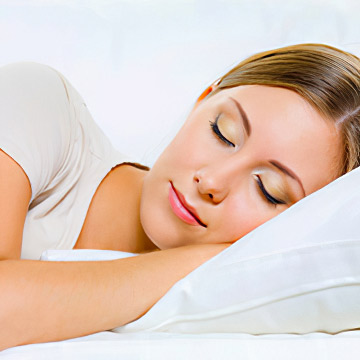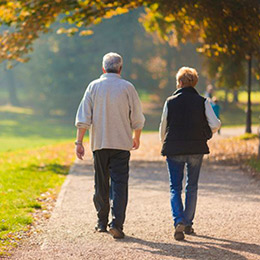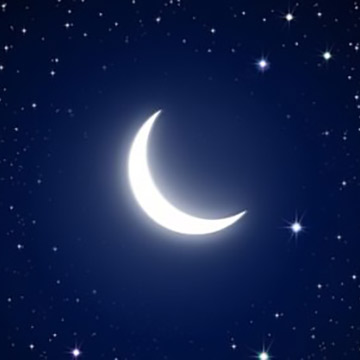“Sleep is the nurse of all living beings.”
This wise precept is from Maharishi AyurVeda, one of the oldest traditions of natural medicine. “Today, over 5,000 years later, we are discovering just how true this is, as well as fascinating details about how sleep applies its magical healing balm to our brains, minds, and bodies each night,” says nationally recognized Ayurveda expert and best-selling author, Nancy Lonsdorf, M.D.
Dr. Lonsdorf, an Integrative Medicine Specialist and frequent speaker on national media, has incorporated Maharishi AyurVeda with her medical practice for over three decades. Her popular books include A Woman’s Best Medicine, Ageless Woman, and The Healthy Brain Solution for Women Over Forty: 7 Keys to Staying Sharp—On or Off Hormones, addressing the prevention and reversal of memory issues and cognitive decline. She received her M.D. from Johns Hopkins School of Medicine and did her psychiatry residency at Stanford University. Learn more ►
In this engaging and informative presentation, Dr. Lonsdorf shares the most effective secrets from Maharishi AyurVeda and modern medicine for blissful, rejuvenating sleep; how to sleep to boost your memory; how sleep erases emotional stress; and much more. She gave this webinar, hosted by Maharishi International University (MIU), on November 14, 2020, as part of the National Coherence Campaign.
Watch Dr. Lonsdorf’s talk on better sleep (1:10:49)
Falling in Love with Good Sleep

Tips for sleeping soundly at any age
“I want you to fall in love with good sleep,” says Dr. Lonsdorf, “because it is actually the foundation of feeling good and enjoying those higher values that we’re so in need of and craving today, of feeling happy, feeling energetic, feeling calm, and even feeling loving.”
Dr. Lonsdorf helps us understand how and why sleep is so important, and offers easy lifestyle and dietary steps to help us gain deep sleep every night. She draws on both the time-tested suggestions of Ayurveda, the world’s oldest system of health, and modern scientific sleep research.
Here’s a preview of just some of what we’ll learn in this lively webinar.
Catching the Melatonin Wave and Going for a “Golden Glow”
Dr. Lonsdorf begins by explaining the importance of the hormone melatonin, which our bodies naturally produce and secrete in a circadian pattern. Melatonin doesn’t cause sleep but rather coordinates the sleep response by signaling that it’s time to sleep.
Melatonin starts being secreted around 8:00 p.m., increases until 10:00 to 11:00 p.m., peaks between 2:00 and 3:00 a.m., and drops off from 5:00 to 6:oo a.m., when the daylight hours begin.

Our bodies follow a circadian cycle throughout the 24-hour period
Maharishi AyurVeda recommends going to bed before 10:00 p.m. whenever possible, which is supported by the melatonin cycle, Dr. Lonsdorf explains: “The earlier we catch this melatonin wave the better, for going to sleep and remaining asleep.”
She shows a chart illustrating how melatonin production increases and decreases over our life cycle. Production peaks from 18 to 20, then steadily drops off in the 30s, 40s, and 50s. In the 60s and 70s, the body produces “a negligible amount of melatonin,” she says, which can lead to more sleep difficulties as people age.
To help us “catch the melatonin wave” which starts rising at 8:00 p.m., Dr. Lonsdorf has a few additional suggestions.
Brightly lit rooms at night suppress melatonin production, as does the blue light commonly emitted from electronic devices, computers, smartphones, and LED lights. She recommends we “turn the lights down and go for a golden glow,” using warm-toned rather than blue-toned lights.

Set your phone to shift to non-blue light at 8:00 p.m.
In addition we can set our phone and computer screens to shift to a yellow light at 8:00 p.m., with an app on the device or one that’s installed. There are also gold-colored glasses to wear while working at a computer at night, which Dr. Lonsdorf uses.
Both modern science and Ayurveda emphasize keeping a regular bedtime. Some sleep researchers recommend setting an alarm to remind us that it’s time to head to bed and go to sleep.
Maharishi AyurVeda recommends going to bed by 10:00 p.m. or earlier, because 6:00 to 10:00 in the evening (and morning) is a “Kapha time” of day. According to Ayurveda, during these times Kapha—the physiological supersystem responsible for structure and substance—is dominant, and the body tends to be more stable, heavy, and even lethargic, so in the evening it’s easier to fall asleep. To learn more, see Dr. Lonsdorf’s article “How to Balance Your Body’s Supersystems and Feel Great Naturally.”
“The earlier we catch this melatonin wave the better, for going to sleep and remaining asleep.” —Dr. Nancy Lonsdorf
The Stages of Sleep and “the Magic of REM”
Dr. Lonsdorf also explains the two stages of sleep, through which the body cycles four or five times during the night: deep non-REM sleep, when there is no dreaming and the body becomes very still, and REM sleep (Rapid Eye Movement), when dreaming occurs.

Both deep non-REM sleep and REM sleep are vital for health
Deep non-REM sleep is critical for three functions that allow us to consolidate our memory and repair tissue:
1. Retention of new learning;
2. Transfer of memory from the hippocampus (temporary storage) to the cortex (longterm storage); and
3. Restorative tissue repair and the creation of new brain cells, hormones, and growth hormone.
Because the deepest cycle of non-REM sleep occurs in the first one to three hours of sleep, this is another reason why it’s important to go to bed by 10:00 p.m., says Dr. Lonsdorf.
The “magic of REM sleep” is how it serves three vital functions for our health and well-being:
1. Dissolves emotional stress;
2. Fosters creativity; and
3. “Cleans the cache” of temporary memories to prepare for a new day.
Because REM sleep is more prevalent in the early morning hours, it is important not to cut morning sleep short. “If you get up too early, at 3:30 or 4:00, you’ll miss a lot of REM sleep and won’t be ready to learn new things,” Dr. Lonsdorf explains.
Although alcohol is sometimes used to relax and aid sleep, it’s best avoided because it can interfere with REM sleep, she says. It can cause sleep to be lighter with more frequent waking up, and impairs the brain’s ability to dissolve emotional stress, which then creates more stress.
Because REM sleep is more prevalent in the early morning hours, it is important not to cut morning sleep short.
5 Ayurvedic Tips for Blissful Sleep

Coconut oil has magical calming powers
1. Massage Oil on the Head and Feet
“Oil has magical powers for calming the nervous system,” Dr. Lonsdorf says. Because oil cannot conduct electricity, it soothes and calms our nerves.
Before going to bed, Maharishi AyurVeda recommends putting a little coconut or olive oil on the top of the head and on the feet. Rub just a small amount of oil between the palms and into the scalp, around the ears, and the back of the neck, not the whole head. Use an old pillowcase for any oil transfer.
For the feet, focus on the soles and the ankles. Be sure to wear an old pair of socks to protect your bed sheets!
This mini-massage immediately helps smooth out feelings of being wound up, agitated, or “buzzy” before bed.

A morning walk helps melatonin production at night
2. Walk in the Morning Light
Dr. Lonsdorf tells the story of a student asking the great ancient Ayurvedic teacher Charaka if there is one thing that everyone can do to benefit their health. “Yes,” he said. “Wake up early in the morning and take a walk in the light of the rising sun.”
She explains that this centuries-old recommendation is supported by modern science, for research has shown that even just 20 minutes of outdoor sunlight before noon aids melatonin production at night.
A morning walk has also been shown to help mood and weight loss. To learn more, see Dr. Lonsdorf’s article “Take a Morning Walk to Lose Weight, Feel Great.”

A cool bedroom at night helps sleep
3. Take a Hot Bath before Bedtime
When it comes to temperature and sleep, Dr. Lonsdorf says it’s best to keep our bedrooms on the cool side, at 65–68 degrees. Research has shown that proper cooling can help us fall asleep 20 percent faster and increase deep sleep by 10–15 percent.
Maharishi AyurVeda suggests cooling the body by taking a hot bath. This sounds counterintuitive, but Dr. Lonsdorf explains that a hot bath helps the body temperature drop by bringing the heat to the surface, where it can then dissipate.
A bath may also follow an Ayurvedic self-massage called abhyanga. Dr. Lonsdorf provides instructions for this form of self-care on her website.

Eat a lighter dinner by 7:00 p.m.
4. Don’t Eat Too Much Too Late
To help us go to sleep easily and deeply, without waking up during the night or too early, both Maharishi AyurVeda and modern science recommend not eating too much too late at night, Dr. Lonsdorf says.
“Eat by 7:00 p.m. and go to bed by 10:00 p.m.,” she says, to allow at least three hours to fully digest dinner before bedtime.
Dr. Lonsdorf also reviews how supplements such as magnesium, serotonin, Omega-3s, and 5-HTP or L-Tryptophan can aid sleep.

Ayurvedic Golden Milk
5. Enjoy Golden Milk
Speaking of the amino acid L-Tryptophan, which is high in milk, a delicious way to help sleep is with “Golden Milk,” says Dr. Lonsdorf.
For this traditional Ayurvedic recipe simply heat milk and add turmeric, ginger, cardamom, and cinnamon to taste.
Dr. Lonsdorf explains that in addition to the L-Tryptophan, the protein and carbohydrate in milk help calm the nervous system. The warmth of the hot milk is also soothing and relaxing.
She also describes herbal sleep support from Maharishi AyurVeda that she has found to be very helpful to her patients. These are available from VPK by Maharishi Ayurveda International Products at mapi.com:
- Blissful Sleep for falling asleep naturally and quickly;
- Stress-Free Mind to take if and when you awaken at 3:00 or 4:00 a.m. and have difficulty going back to sleep; and
- Stress-Free Emotions to take before bedtime if feeling upset or agitated.
For more tips, watch Dr. Lonsdorf’s talk on better sleep (1:10:49)
In this engaging and informative presentation, Dr. Lonsdorf shares the most effective secrets from Maharishi AyurVeda and modern medicine for blissful, rejuvenating sleep; how to sleep to boost your memory; how sleep erases emotional stress; and much more.
Dr. Nancy Lonsdorf currently sees patients in her private practice in both Fairfield, Iowa, and San Diego, California. For tips, self-quizzes, and information on consultations with Dr. Lonsdorf, visit www.drlonsdorf.com. To schedule a personal Wellness Consultation by phone or teleconference, or an in-person visit, please contact Dr. Lonsdorf’s office at 641-469-3174 or healthoffice@drlonsdorf.com.


Comments
you may also like
Better Health
How to Sync Your Day with the Rhythms of Nature | 2:42
Time your sleep, meals, and exercise with nature for maximum health and happiness. Dr. Nancy Lonsdorf, expert in Maharishi AyurVeda®, offers simple, easy-to-follow lifestyle tips from the world’s oldest system of natural healthcare.
Better Health
7 Self-Care Tips for Your Mind-Body Type
Take Dr. Nancy Lonsdorf’s Quiz for personal wellness. You'll identify your mind-body type and gain tailored guidelines for health, vitality, and growth of consciousness throughout the year.
Better Health
Secrets of Emotional Balance: 10 Ways to Even Out Your Emotions in Uneven Times | 1:13:10
Nancy Lonsdorf, M.D., one of the nation’s most prominent Ayurvedic doctors, shares 3 paths to emotional balance, 5 proven ways to boost your bliss, how to know your emotional “type,” and key tips for you.
Better Health
7 Key Ways to Sharpen Your Memory
Ever worry about blanking on a word or name? Nancy Lonsdorf, M.D., renowned Maharishi AyurVeda® expert, provides easy integrative health tools to maintain the brain, combining the best of ancient and modern approaches for a resilient mind and memory.